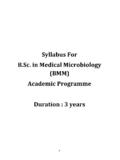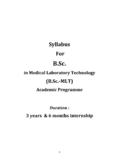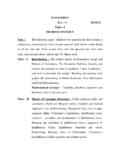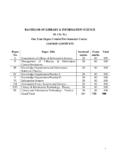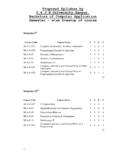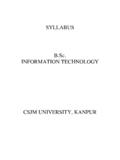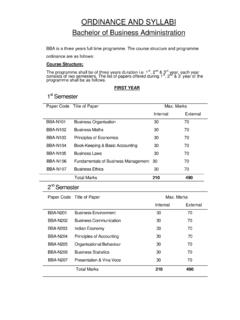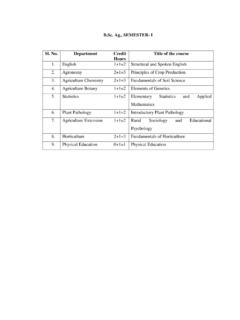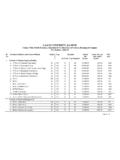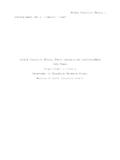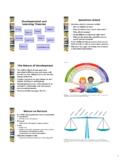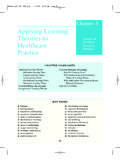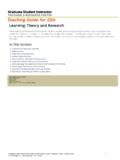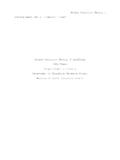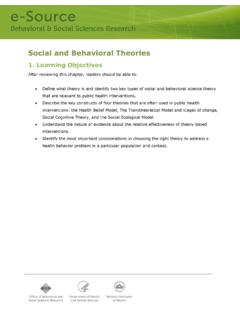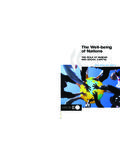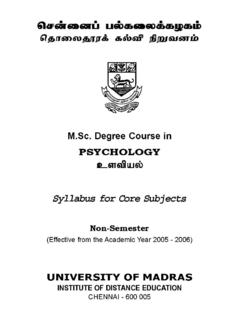Transcription of C. S. J. M. UNIVERSITY, KANPUR
1 REVISESD SYLLABUS OF PSYCHOLOGY. C. S. J. M. UNIVERSITY, KANPUR . SUBJECT- PSYCHOLOGY. (UNDERGRADUATE COURSES). I. Paper 1 : Basic Psychological Processes Max. Marks : 35. Paper 2 : Human Development Max. Marks : 35. Paper 3 : Practical Max. Marks : 30. II. Paper 1 : Psychopathology Max. Marks : 35. Paper 2 : Social Psychology Max. Marks : 35. Paper 3 : Practical Max. Marks : 30. III. COMPULSORY PAPERS. Paper 1 : Psychological Assessment and Statistics Max. Marks : 40. Paper 2 : Personality Max. Marks : 40. OPTIONAL PAPERS (Any one of the following) Max. Marks : 40. Paper 3 : (A) Counselling and Guidance (B) Health Psychology (C) Environmental Psychology (D) Organizational Psychology Paper 4 : Practical Max. Marks : 30. I. Paper 1 : BASIC PSYCHOLOGICAL PROCESSES Marks - 35. REVISESD SYLLABUS OF PSYCHOLOGY. Unit I. Introduction: Definition, Nature, Scope and Applications of Psychology.
2 Methods: Introspection, Observation, Experimental, Interview, Questionnaire and Case Study. Contemporary Perspectives: Biological, Cognitive, Psychoanalytical, Humanistic, Evolutionary and Cross-cultural. Biological Bases of Behaviour: Evolution, Genes and Behaviour. The Response Mechanism: Receptors, Effectors and Adjustors. The Nervous System: The Basic Structure, Functions and Divisions of the Peripheral and Central Nervous System. Unit II. Sensory Processes: Visual, Auditory and Other Senses: Structure and functions. Attentional Processes: Nature, Types and Determinants of Attention. Perceptual Processes: Nature and Determinants, Perceptual Organization, Form, Space and Depth Perception. Perceptual Constancy and Illusion.. Unit III. Learning: Nature of Learning Process. Classical and Operant Conditioning: Basic Principles and Types. Thorndike's Trial and Error theory , Gestalt theory of Insight, and Bandura's Observational Learning theory .
3 Transfer of Training, Types of Transfer, Factors Influencing Learning. Memory and Forgetting: Memory: Encoding, Storage and Retrieval Processes. The Stages of Memory: The Information Processing Approach. The Sensory, Short Term and Long Term Memory. Techniques of Improving Memory. Forgetting: Nature, Causes and Various Theories of Forgetting: Decay, Interference, Motivational theory . Motivation and Emotion: Indicators of Motivation, The Motivational Cycle. Classification of Motives: Biogenic, Sociogenic and Personal Motives. Emotion: Nature and Dimensions of Emotion. Development, Expression and Control of REVISESD SYLLABUS OF PSYCHOLOGY. Emotions. Theories of Emotion: James-Lang'e, Cannon-Bard, Schachter and Singer, Lazarus, Lindsley's Activation theory . Physiological Correlates of Emotion. Culture and Emotion. Unit IV. Thinking: Nature and Types of Thinking. Realistic and Autistic Thinking.
4 Tools of Thinking: Concepts, Imagery, Prototypes, Script, Schema, Language and Thought. Intelligence: Definition, Concept of , Genetic and Environmental Influences on Intelligence. Factor Theories: Spearman, Thurstone and Guilford. Process- oriented Theories: Piaget, Bruner, and Sternberg. Creativity and Intelligence. Personality: The Concept of Personality. Trait and Type Approaches of Personality. The Biological, Social and Cultural Determinants of Personality. BOOKS RECOMMENDED: Atkinson and Hilgard (2002). Introduction to Psychology. New York: Thomson Wadsworth. Baron, R. A. (1995). Psychology: The Essential Science. New York: Allyn and Bacon. Feldman, R. S. (2006). Understanding Psychology. India: Tata McGraw Hill. Lefton, L. A. (1985). Psychology. Boston: Allyn and Bacon. Morgan, C. T., King, , Weiz, J. R., Schopler, J. (2001). Introduction to Psychology. Tata McGraw Hill.
5 Singh, A. K. (2000). Uchchatar Samanya Manovigyan. New Delhi: Motilal Banarsidas. Zimbardo, and Weber, (1997). Psychology. New York: Harper Collins College Publishers. I. Paper 2 : HUMAN DEVELOPMENT Marks-35. Unit I. REVISESD SYLLABUS OF PSYCHOLOGY. Introduction: Concept; Determinants: Biological, Social, Cultural and Ecological; Prenatal Development Developmental stages: Theories of Freud and Erikson. Approaches: Longitudinal, Cross Sectional, Sequential, Cohort methods: Biographical, Case study and Observational method. Unit II. Cognitive Development: Nature and Approaches: Piaget,Vygotsky and Information Processing. Perceptual Development and Concept Formation: Perceptual Development: Visual, Auditory and Tactual; Concept Formation: Acquisition of Concepts of Time and Space. Language Development: Stages and Determinants Unit III. Emotional Development: Primary Emotions: Development from Infancy to Adulthood; Concepts of Emotional and Spiritual Intelligence.
6 Social Development: Stages; Factors affecting Social Development; Concept of Social Intelligence. Moral Development: Kohlberg's theory , Social Learning Theories. Unit IV. Self and Identity: Self concept and Mirror Images, Emergence of Self: Development of Personal Identity. Developmental concerns during Adulthood: Marriage, Family and Work: roles and relationships, Mid life Crisis. Aging and old age: Problems of Physical Health, Cognitive deterioration dementia, Alzheimer Disease, Problems related to Retirement, Bereavement and Loneliness. BOOKS RECOMMENDED: Berk, (2003). Child Development, Boston: Allyn and Bacon. REVISESD SYLLABUS OF PSYCHOLOGY. Hurlock, C. (1981). Developmental Psychology, McGraw Hill. Lal, (2001). Vikasatmak Manovigyaan. Mishra, (1999). Aaj ka Vikasatmak Manovigyaan. Sahitya Prakashan, Agra. Shaffer, (1985). Developmental Psychology. Fourth Ed. Brooks and Cole Publications.
7 Shamrock, (1999). Lives span Development. New York: McGraw Hill. Singh, (2000). Adhunik Vikasatmak Manovigyaan, Motilal Banarsidas Publication, Vasranasi.. I. Paper 3 : PRACTICAL Marks-30. Any eight of the following: Learning Motivation Forgetting Perception Memory Adolescent's Problems Emotional Maturity Moral Judgment Social Maturity Introversion Extroversion REVISESD SYLLABUS OF PSYCHOLOGY. II. Paper 1 : PSYCHOPATHOLOGY Marks-35. Unit I. Introduction to Psychopathology: The Concept of Normality and Abnormality;. Classification of Mental Disorders (ICD X and DSM IV). Mental Illness: Signs, Symptoms and Syndromes. Causes of Abnormal Behavior: Biological, Psychological, Social and Cultural Factors. Psychological Models of Psychopathology: Biological, Psychodynamic, Behavioural, Cognitive-Behavioural, Humanistic, Existential, Socio-cultural. Unit II. Stress: Nature, Sources and Types; PTSD and Acute Stress Disorder.
8 Coping with Stress. Psychosomatic Disorders : Symptoms, Causes and Treatment. Unit III. Anxiety Disorders: Panic Disorder, Phobia, Obsessive Compulsive Disorder, Generalized Anxiety Disorder; Symptoms, Types, Etiology and Treatment. Somatoform Disorders: Dissociative Disorders. Unit IV. Psychotic Disorders: Symptoms, Types, Etiology and Treatments. (a) Schizophernia (b) Delusional Disorders. Mood (Affective) Disorders: Manic Episode, Depressive Episode, Bipolar Affective Disorders, Dysthymia. Personality Disorders: (a) Dissociative (b) Impulsive (c) Anti-Social (d) Borderline (e) Avoidance (f) Dependent Personalities. BOOKS RECOMMENDED: REVISESD SYLLABUS OF PSYCHOLOGY. Buss, (1999). Psychopathology. New York: John Wiley. Carson, , Butcher, J. N. and Mineka, S. (2010). Abnormal Psychology and Modern life. Pearson Education, Inc. and Dorling Kindersley Publications Inc. Sarason, G.
9 I. and Sarason, R. V. (2007). Abnormal Psychology: The Problem of Maladaptive Behaviours (11th Edition). Pearson Education Inc. and Dorling Kindersley Publishing Inc. Singh, A. K. Adhunik Asamanya Manovigyan. Patna: Moti Lal Banarsi Das. II. Paper 2 : SOCIAL PSYCHOLOGY Marks-35. Unit I. Introduction: Nature and Scope; Methods of Studying Social Behaviour: Observation, Experimental, Field Study, Survey, Sociometry and Cross-cultural. Socialization: Agents and Mechanisms, Socialization and Deviation. Perceiving Others: Forming Impressions; Role of Non-verbal Cues, Group stereotypes, Central Traits; Primary and Recency Effects; Models of Information Integration; Attribution of Causality: Biases and Theories (Jones and Davis, Kelley). Unit II. Perceiving Groups: Prejudice, Stereotypes and Conflicts: Sources, Dynamics and Remedial Techniques. Interpersonal Attraction: Nature, Measurement and Antecedent Conditions of Interpersonal Attraction.
10 Attitudes: Nature, Formation and Change of Attitudes. Measurement of Attitudes. Unit III. Group Dynamics and Influence: Structure, Function and Types of the Groups. REVISESD SYLLABUS OF PSYCHOLOGY. Social Facilitation, Social Loafing, Individuation; Group Cohesiveness, Norms and Decision Making. Conformity, Obedience and Social Modeling. Leadership: Definitions and Functions; Trait, Situational, Interactional, Behavioural and Contingency Approaches to Leadership Effectiveness. Unit IV. Communication: Verbal and Non-verbal Strategies. Language and Social Interaction. Barriers to Communication. Aggression: Determinants: Personal and Social; Theoretical Perspectives: Biological, Trait, Situational and Social Learning; Control of Aggression. Helping Behaviour: Determinants: Personal, Situational and Socio-cultural Determinants; Bystander Effect. Theoretical Perspectives: Exchange and Normative.
